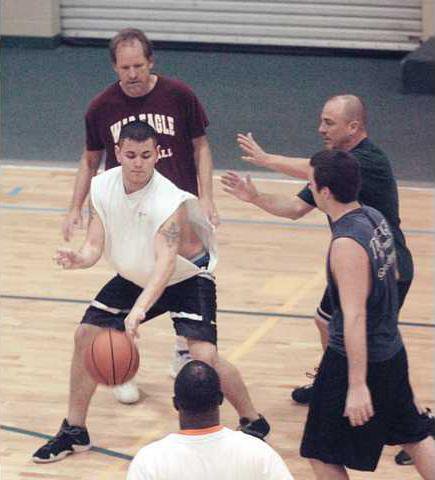1020stressaud
Psychiatrist Dr. Jeff Black explains why people with addictions are vulnerable to relapse during tough times.It’s hard not to be stressed out these days.
You can’t turn on the TV news without hearing about banks failing or the stock market crashing. Financial experts have warned of "the worst crisis since the Great Depression."
You’re worried about losing your job, your house, your health insurance, your retirement income. And because you don’t know how to make yourself feel better, you may resort to things that aren’t good for you — drinking, smoking, overeating.
Is it possible to weather this financial storm with your health intact?
Yes, according to Cynthia Purcell, a licensed professional counselor in Gainesville.
"Focus on what you can do, rather than what you can’t do," she said. "I’m not saying you should look at things with rose-colored glasses. But you can still have hope and set goals."
Being laid off from work or losing a home to foreclosure can be devastating, Purcell said.
"But keep in mind that you’re not the only one. This is happening all over the country, so don’t take it personally," she said.
An economic downturn tends to make people feel helpless, because no matter what they do, they can’t change what’s happening. But Debbie Wilburn, a consumer science agent with the Hall County Extension Service, said even taking small actions can help people make sense of chaos.
"With the economy, there’s things that we can’t control. But you can control your emotions," she said.
Wilburn recommends that people keep a record of every penny they spend.
"By tracking where your money goes, you can see what you can cut out (to reduce expenses)," she said.
Having a sense of control over one’s destiny usually makes people feel more optimistic. And a positive outlook can benefit the whole family.
"Kids kind of take their cues from their parents," Wilburn said. "They may have no idea about the economy, but they see that mom is crying and dad is short-tempered."
Dr. Jeff Black, a psychiatrist with Laurelwood at Northeast Georgia Medical Center, said people need to seek help if they are experiencing symptoms of a serious mental illness such as depression, or if they’ve relapsed into an addiction.
"If it becomes overwhelming, you need to talk to someone, whether it be a formal counselor or a crisis line," he said.
When money is tight, people may be reluctant to go to a doctor or psychologist, thinking they can’t afford it. But Black said lack of income shouldn’t be a deterrent to getting help.
"There are resources for people who can’t pay," he said.
United Way of Hall County’s 211 referral line can connect people with services, including several local counseling agencies, that charge fees on a sliding scale based on income.
Black said people also can help themselves by not obsessing over economic forecasts.
"Constantly watching the news tends to make people dwell on it," he said. "I’m not advocating that people put their heads in the sand. They need to hear the news, and they need to know what’s going on."
But if it becomes too stressful, it’s a good idea to step away for a while. Black said exercise, meditation and simply being outside in the sunlight and fresh air all have been documented to improve mood.
Unfortunately, when many people feel depressed, their first impulse is to reach for any substance that they think will help — a cigarette, a beer, a gallon of ice cream. Others engage in behaviors such as gambling or compulsive shopping.
Black said though all of these things can have negative consequences, they also can release endorphins, the brain’s feel-good neurochemicals. Endorphins help deactivate your reaction to stress.
"Extreme stress sends the body into hyperdrive," he said. "We get that ‘fight or flight’ response, which pumps you full of adrenaline and increases your heart rate."
Prolonged exposure to stress carries serious health risks, including heart disease, impaired glucose metabolism, high blood pressure and sleep disorders.
"Alcohol and drugs may make stress go away temporarily, but they’re not a long-term fix," said Black.
Instead, he advocates exercise and other healthy alternatives.
If your finances are so precarious you can barely fill up the gas tank, you may not feel you’re able to join a fitness club or sign up for a yoga class.
But there’s no cost to simply going outside and walking, or finding a relaxing place to listen to music.
And there are some low-cost options for people who prefer to exercise with a group. For example, the Family Life Center, a fitness center located at First Baptist Church on Green Street, charges $25 a month for individuals and only $8 for church members.
Center director Liz Coates said most clients are not members of First Baptist. Many come almost on a daily basis, to take advantage of the exercise equipment, indoor track, and basketball and racquetball courts. They also seem to thrive on the camaraderie.
"We have an exercise class of mostly women that has been meeting for almost 20 years," Coates said. "They’re always there for each other. Same with the men who come in at noon to play basketball."
She said she often hears folks complaining about high gas prices and the state of the economy.
"They sometimes come in here in a bad mood, but they’re always smiling when they leave," she said.
"I think exercise is not only a good way to relieve stress, it’s essential for your physical, mental and emotional health. And when you do it with other people, it becomes a social and even a spiritual experience."

